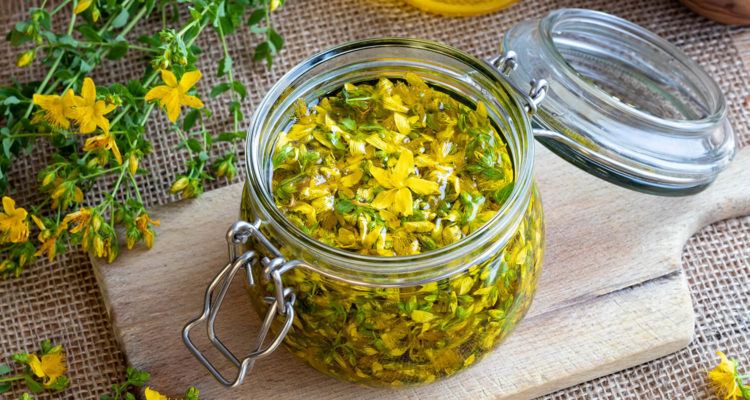
Is St. John's wort really as useful as it is believed to be?
0
The plant really helps to cope with depression , but it is dangerous because of its side effects.
St. John's wort is a tall plant with small yellow flowers.
According to the version of the Encyclopedic Dictionary of Brockhaus and Efron, it owes its name to the effect it produces on herbivores. Cattle that have eaten the flowers do not die, but become slowed down, sometimes lose their balance and fall, as if killed by an invisible hunter.
According to another version, the word comes from the Kazakh “jerabay” – “healer of wounds”. Actually, it is thanks to them that St. John's wort is known.
We found out whether the plant really has a scientifically proven healing effect.
What is St. John's wort known for
St. John's wort was used for the treatment of wounds and various diseases by the most famous doctors of antiquity – Hippocrates, Dioscorides, and Pliny the Elder. The legendary Avicenna claimed that the seeds of the plant, taken internally, stop a strong and persistent fever, and the infusion heals inflammation of the sciatic nerve.
Folk healers call St. John's wort a herb for 99 diseases.
Modern doctors, too. the plant is considered promising. It is assumed that St. John's wort in any form – tea, tincture, liquid oil extract, pills – can really have a beneficial effect on health:
- Relaxes muscles and relieves spasms. It can be useful, for example, for women who suffer from PMS and menstrual pain.
- Gives a mild sedative effect.
- Helps sleep with insomnia.
- Relieves neuralgia pain.
- It has anti-inflammatory properties, and compresses based on St. John's wort can reduce swelling.
- Reduces itching in vaginitis and hemorrhoids – for this purpose, St. John's wort tincture is used for washing.< /li>
- Helps the body resist viral infections. In particular, we are talking about herpes and the human immunodeficiency virus (HIV).
- It has an antitumor effect. That is, theoretically, it can reduce the risk of developing cancer.
But there is an important nuance here. These properties have not yet been confirmed by a sufficient number of studies.
Nevertheless, some possibilities of St. John's wort have already been proven fact.
What useful properties of St. John's wort have been confirmed by scientists
This is what St. John's wort is useful for.
1. Helps to cope with depression
A number of studies support that St. John's wort tea or supplements can be effective in treating mild to moderate depression.
In addition, an analysis of 27 studies found that St. John's wort is as effective in treating depression as prescription antidepressants. .
It is assumed that this effect is related to the active substances contained in the plant – hyperforin, hypericin and adhyperforin. Getting into the body, they increase the production of the “hormones of happiness” serotonin and dopamine.
2. Accelerates the healing of burns, wounds, bedsores
This effect is observed when an oil tincture of St. John's wort is applied to the skin.
What is the harm of St. John's wort
Despite the fact that the benefits of St. John's wort in some cases scientifically confirmed, doctors still treat the plant with caution. And there are serious reasons for that – at least three.
Therefore, you should take St. John's wort only after consultation with a therapist or another doctor who observes you.
1. St. John's wort reduces the effectiveness of many drugs
When using St. John's wort, the level of enzymes in the blood increases, which our body uses to remove certain chemicals from the bloodstream. Including medicines.
Taking St. John's wort in any form can weaken or nullify the effect of such drugs as:
- contraceptive pills;
- cyclosporins (medicines that prevent organ rejection after transplantation);
- agents used in chemotherapy and HIV treatment;
- anticoagulants (blood thinners).
< li>digoxin (medicines prescribed for heart diseases);
And the use of “wound healer” together with antidepressants can cause a dangerous increase serotonin level. This condition is known as serotonin syndrome.
Therefore, experts at the reputable medical organization Mayo Clinic recommend that you avoid St. John's wort if you are taking any prescription drugs.
2. This can lead to sunburn
Some substances contained in St. John's wort (for example, hypericin) increase the sensitivity of the skin to ultraviolet rays. Therefore, it is better to refuse the use of a biological supplement in the sunny season or if you plan to visit a solarium.
3. St. John's wort has side effects
Although the plant is generally considered safe (as long as you don't take it more than the amount prescribed in the instructions for the supplement), it can cause some health problems. Among them:
- unmotivated anxiety;
- a tingling or burning sensation in the limbs;
- dizziness and headache;
- increased fatigue; dry mouth; diarrhea; low blood sugar; stomach discomfort; li>
- too bright, restless dreams.
In addition, “herb from 99 diseases” is not recommended for pregnant and lactating women. Scientists do not yet know how taking St. John's wort can affect a child, so it is better not to risk it.









Leave a Reply